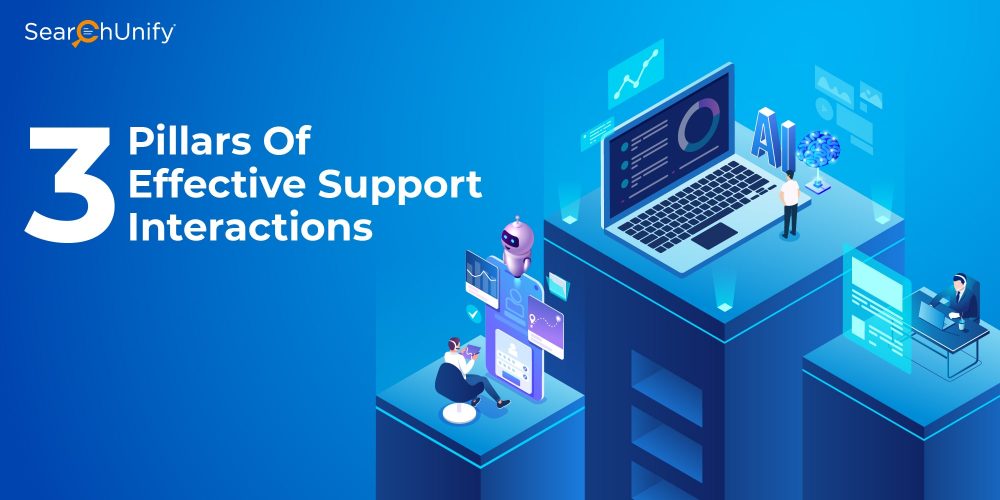
Rising customer expectations have propelled the use of the latest technology for better customer service. Artificial intelligence in support interactions is one such latest tech trend that has taken businesses by storm. Gartner says that by 2021, 15% of all customer service interactions will be completely handled by AI, an increase of 400% from 2017.
In fact, as many as 83% of businesses say AI is a strategic priority for them today. Smarter firms have started using AI applications like chatbots to provide customers with enhanced interactions. But what exactly is an enhanced support interaction? What is it that customers expect from your support channels?
TSIA outlines three critical themes that every support strategy should incorporate—Persistent, Personalized & Intelligent support. Let’s discuss each one of them in detail and also how AI can help achieve that:
1. Persistent Support
Today, customers use different channels ranging from social media to email, live chat etc. for communication. When a customer raises the same query from a different channel, the support team should know that a similar request has been raised.
When asked to repeat their query, most customers look at it as an inconsistent experience. 78% of boomers are turned off when they have to restart a conversation with a brand, which can lead them to consider discontinuing the use of a product altogether. So your business should provide support interactions that are omnichannel.
To do so, you should integrate all your channels that customers use like community, help portals etc, with your support platform so that all the latest developments regarding a case are updated. This way you provide visibility to the agent handling the ticket. They will know what tickets and issues the customer raised previously.
Role Of Cognitive Search In Providing Persistent Support
A cognitive search engine gives your agents insight into a user’s journey across various touchpoints so that support agents can track it and provide a more consistent experience without the user having to repeat the issue.
Also, an omnichannel chatbot, powered by cognitive search, installed on your website is able to fetch all the information spread across various channels and provide more relevant response to the customer. And if the user doesn’t find the response satisfactory, the bot can provide an option to connect with an agent. It will pass on the necessary information to the agents which they can use before starting the conversation to provide a consistent experience.
2. Personalized Support
Personalization acts like a primer for your support interactions. The more personalized your support content, the better your customers’ interaction will be. Organizations have access to a lot of user data these days, which can be leveraged to customize self-service portals so that users see content relevant to products/tools they use.
For instance, when a customer logs into your community or another web portal you can display a dynamic, personalized FAQs list and recommended articles list. The idea is to present customers content, based on their search history, profile, version of the product they use, etc.
Role Of Cognitive Search In Providing Personalized Support
A cognitive search engine uses machine learning that trains itself using the data from customers’ past transactions. ML is capable of differentiating users based on their profiles, permissions, and previous history to personalize the content. A self-service portal powered by cognitive search displays dynamic recommendation lists of articles and FAQs specific to an account. Also, when a customer is creating a case, ML & NLU algorithms can auto-fill fields (like product version, other basic information) to enhance the user experience.
3. Intelligent Support
No customer likes to wait in the queue when they call your contact center to seek help with or complain about your product or service. And after the wait, if they have to that is, it further annoys them when the agent on the other side of the call doesn’t have expertise in the domain they seek help with.
This can be avoided by leveraging tech based on powerful NLP algorithms. There are AI-powered products that have the capability to recognize the priority and type of the issue based on the speech patterns or keywords used and route the case to a more suitable agent.
Role Of Cognitive Search In Providing Intelligent Support
A cognitive search engine is powered by NLU algorithms. It has the ability to suggest the first step in the tickets logged by customers by recognizing keywords. Not only does this speed up the support process but it also reduces human intervention. Cognitive search can be utilized to classify user queries into different predefined categories based on their content. Then, they can be routed to the right team for handling or immediate assistance.
Conclusion
It can be said that with AI you can automate processes and provide the intelligent support that your customers desire. It’s not here to replace your support staff but to aid them in their job.
Want to delight your customers with world-class support? Know how cognitive search can help.














